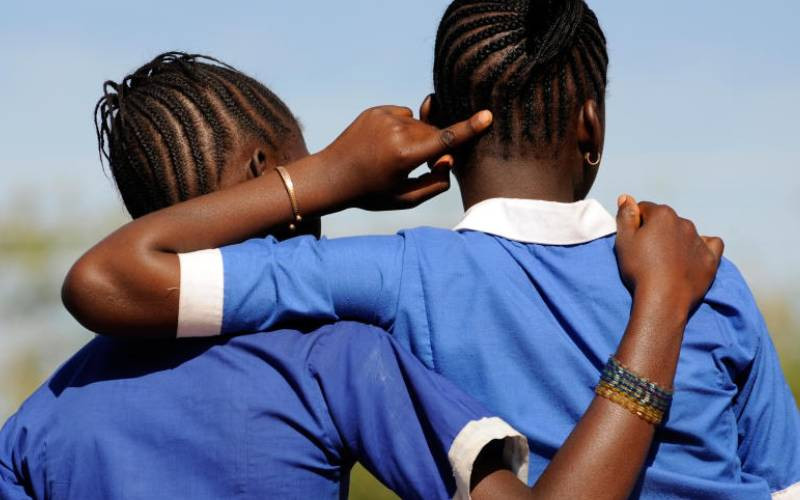
As a child, Kate Kibarah was obese. It didn’t matter in primary school as nobody cared about her being chubby. This, however, changed when she joined high school, as teens in the neighbourhood nicknamed her “balloon”.
“I started discovering a lot about my body. I realised l was actually fat, weighing 95kg. But this was a family problem, as both my parents and siblings were heavy,” she begins, during interview in her office located in Kilimani area.
The humiliation became a blessing in disguise, because it drove her to read various books and research widely on natural remedies for her weight problem.
After Form Four, Kate was to study Law at the University of Nairobi, but opted for a degree in natural health, to pursue more about her problem.
Unfortunately, no Kenyan University offered the course. Instead, she did Diet and Nutrition locally. “I started practising what l studied; changed my lifestyle — eating the right kinds of foods, exercising.
Slowly, I started to lose weight. Many people noticed and asked me what I had done to lose the weight,” she explains.
She later got a chance to study for a degree in Clinical Nutrition and furthered it into natural health, which includes colon hydrotherapy. Initially, Kate had hoped to get employed after training but realised she could make a business out of her passion. She started a consultancy firm, advising individuals and small groups about eating natural foods.
Soon, she started a colonic hydrotherapy service and gave specialised health training through lectures and presentations for corporations, and social networks. Her popularity saw her invited to host radio and television programmes on healthy lifestyles.
By this time, so many of her clients complained of difficulty accessing the healthy organic foods she recommended. She realised the gap, and responded by starting to grow, process and sell organic products. Today, her company supplies a range of organic products such as Kate’s Organics Moringa Oleifera Leaf Powder, Kate’s Organics Green Tea, Kate’s Organics Aloe Vera Natural Juice, Kate’s Organics Everyday Detox Tea, Kate’s Organics Pure Honey, Kate’s Organic Rejuvenate Plus and Kate’s Organics Healthy Greens.
She says people were used to the name Kate, therefore resolved to use same name on her products to promote marketing. She says it worked wonders. These products can be found in leading Kenyan supermarkets, and other outlets including healthy living shops and pharmacies in East African and beyond.
The demand for the products is overwhelming and she cannot fully satisfy the market. “People realising the need for good lifestyle, which goes with natural foodstuffs has worked in my favour,” she explained.
She targets the woman, who she says controls the household. “If a woman decides you must eat healthy, it will happen,” notes the fifth born in a family of seven siblings — six girls and a boy.
She sources the raw material of high quality produce at competitive prices and from organically certified producers. She says she also supports small scale holder farmers including single mothers and widows who grow organic produce in Kenya, Uganda and Tanzania. She assists them with trainings, inputs and anything they need to run the farms.
no short cuts
So, how much did she invest in the business? She explains, “I cannot quantify. When I started offering consultancy services, I had nothing. I used money that came later to start processing products. I didn’t go for a bank loan. If you have a good idea, you can start a business.”
Kate says being honest and sincere has made her business grow. “My customers know my products are 100 per cent pure organic. I don’t use short cuts,” she states.
She appreciates Kenya Organic Association Network (KOAN) which supported and advised her when she sought to venture into the organic enterprise. “It gave me a platform to meet, and interact with various players and stakeholders in the entire organic products value chain,” explains Kate, who describes herself as God-fearing, patient, self-driven and tolerant woman.
Kate, born and brought up in Nairobi, is still single. She wakes up at 5am, takes 30 minutes for spiritual reflection and briefly jogs as part of her routine exercise. She takes breakfast and arrives in the office before 8am. She goes to bed around 10pm.
She loves singing gospel music in church, swimming, jogging/exercising, camping and traveling widely.
She has written several books on healthy living including, “The Indigenous Food Kitchen” which is about preparing foods in a healthy way.
Kate explains the success of Kate’s Organics Company as well as its contribution to promoting a healthy nation earned her the prestigious Africa’s Most Influential Woman in Business and Government Award in 2013, a South African award, twice in a row 2013 and 2014, and has been nominated the third time, this year.
In 2014, Kate featured in the Top 40 Under 40 Women list run by Business Daily. In 2013, she pocketed the Smart Woman and Youth Award, and her Innovation’ Kates Organics has been recognised by the UN Sharefair Women 2014.
Kate is also Organic Brand Ambassador for East Africa. She explains that her triumph has not gone without hitches. “Some of my stockists take long to pay, yet I deal with small scale farmers’ pockets cash on delivery,” she said.
Another problem is that awareness on organic food is still low, as most people can’t tell the difference between them and other products, therefore more campaigns need to be done.
Also, growing organic foods takes time, for instance aloe vera takes over five years to mature. It is also a process before a farm is certified to grow organic foods plus there are cost implications.”
Kate finds that the supply of organic raw material is not enough but she cherishes challenges: “If you cannot feel them, then there’s no impact in what you are doing.”
Her plan is to make Kate’s Organic internationally recognised Kenyan flagship for organic production and best practice for the promotion of a healthy lifestyle. She also wants to become a full time organic farmer, grow crops for the local and export market, and set up a base for Kate’s Organics in South Africa and West Africa.
Kate does a lot of charity work-donating beddings, solar panels, clothes and foodstuffs to various children homes. She also teaches them to plant organic crops like onions, tomatoes, cabbages and sukuma wiki and moringa.
Kate is currently pursuing a PhD on Alternative Medicine in the UK. She’s a member of Africa Agribusiness Academy (AAA), Board Member Cancer Awareness and Support Centre (CASC), Vice Chair-International Year of Family Farming (IYFF) and Board Member FK Youth Mentoring Network.
 The Standard Group Plc is a multi-media organization with investments in media platforms spanning newspaper print
operations, television, radio broadcasting, digital and online services. The Standard Group is recognized as a
leading multi-media house in Kenya with a key influence in matters of national and international interest.
The Standard Group Plc is a multi-media organization with investments in media platforms spanning newspaper print
operations, television, radio broadcasting, digital and online services. The Standard Group is recognized as a
leading multi-media house in Kenya with a key influence in matters of national and international interest.




